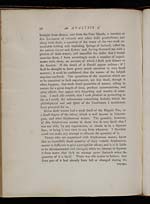Joseph Black (1728-1799)
Analysis of the waters of some hot springs in Iceland
96
An ANALYSIS of
brought from thence, and from the Faro Islands, a number of
fine specimens of volcanic and other fossil productions, and
along with them, a quantity of the water of the two most re-
markable boiling and exploding springs of Iceland, called by
the natives Geyzer and Rykum; and having favoured me with a
portion of these waters, and expressed his desire that I would
examine them, I have accordingly made a number of experi-
ments with them, an account of which I shall now submit to
the Society. If the detail of it should appear tedious; if I
shall be thought to have given much attention to very small
matters; it must be considered, that the nature of the subject
requires exactness. The quantities of the materials which are
to be examined in such experiments, are but small, though it
often happens, that these small quantities of matter, acting in
nature for a great length of time, produce accumulations, and
other effects, that appear very surprising and worthy of atten-
tion. I must also confess, that I took pleasure in promoting, as
far as I could, the information concerning Iceland, which the
philosophical zeal and spirit of the Gentlemen I mentioned,
have procured for us.
BOTH these waters had a weak smell of the Hepatic Gas, or
a small degree of the odour, which is well known in Harrow-
gate, and other sulphureous waters. The quantity, however,
of this sulphureous matter in them was so very small, that I
was not able, by any experiments, to obtain it in a separate
state, or bring it into view in any form whatever. I therefore
could not make any attempt to estimate the quantity of it.
THOSE who are acquainted with sulphureous waters, know
that an incredibly small quantity of their volatile sulphureous
matter is sufficient to give a perceptible odour; and it is so liable
to be decompounded and changed, while we attempt to separate
it from water, that such an attempt never succeeds when the
quantity of it is small. There was also reason to believe, that
some part of it had already been lost or changed during the
voyage,


